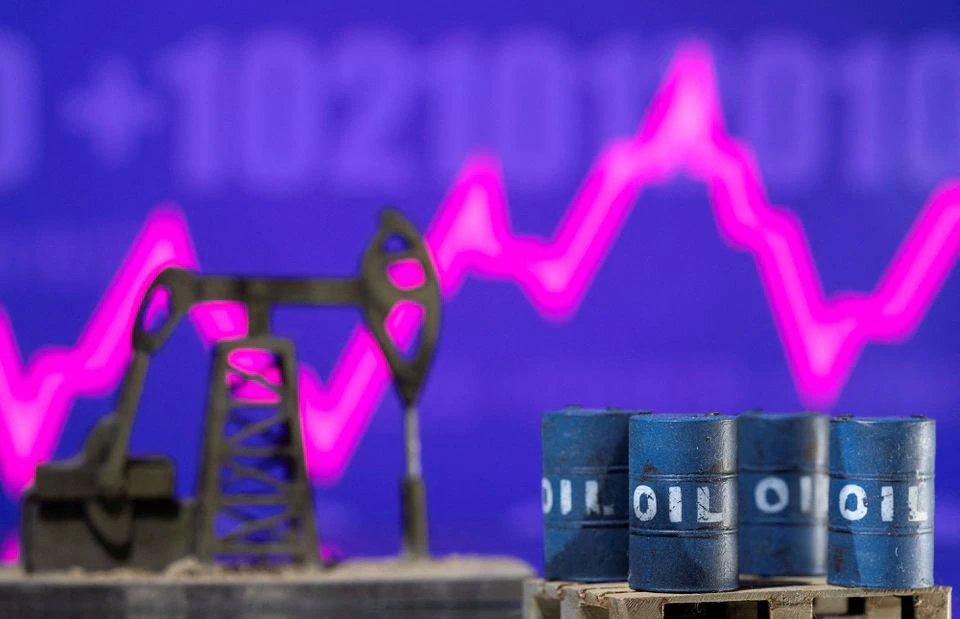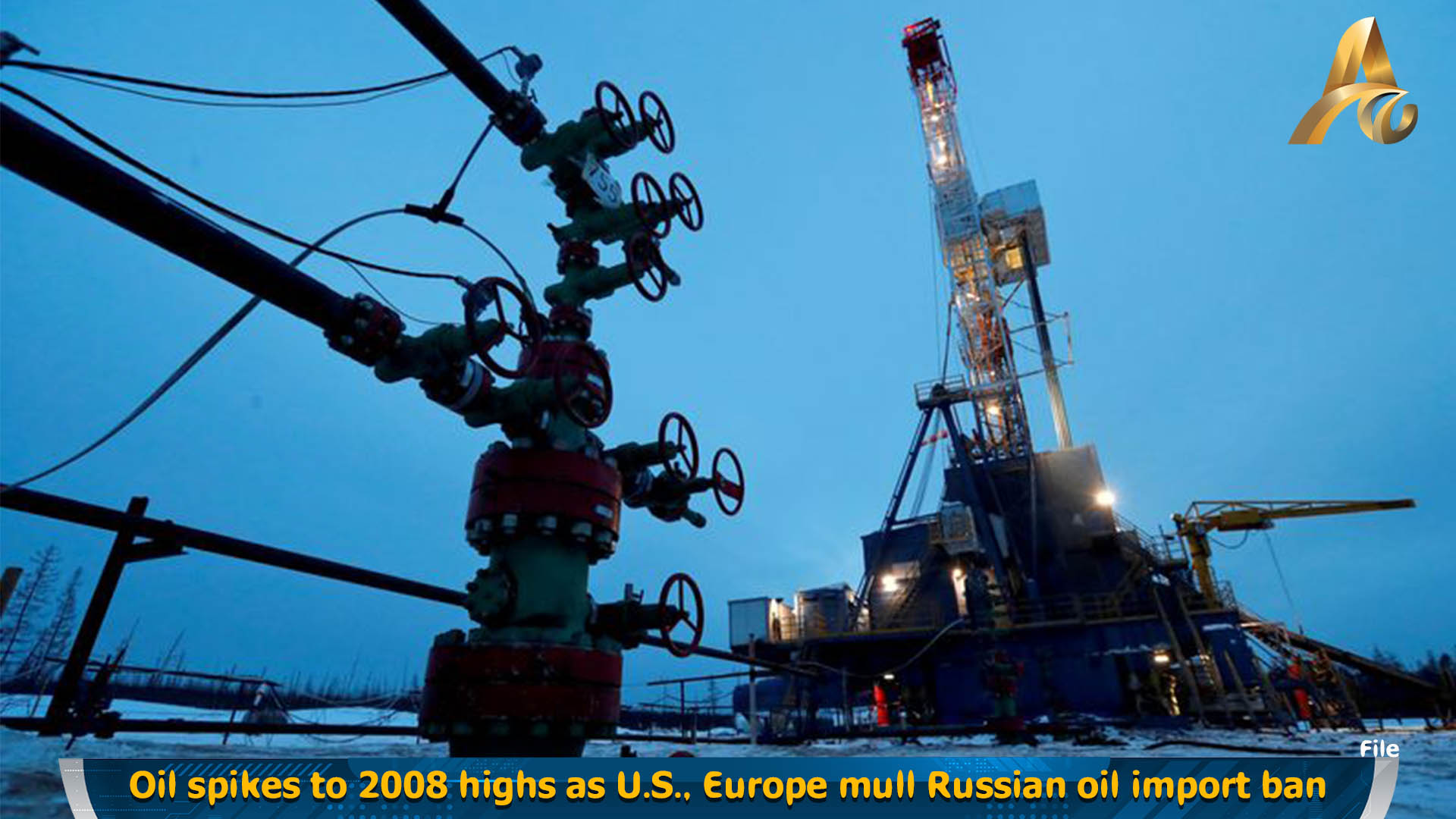INTERNATIONAL: Oil prices soared more than 9% on Monday, touching their highest since 2008, as the United States and European allies mull a Russian oil import ban and delays in the potential return of Iranian crude to global markets fuelled tight supply fears.
Brent crude futures jumped $12.61, or 10.6%, to $130.72 a barrel by 0449 GMT, while U.S. West Texas Intermediate (WTI) crude climbed $10.41, or 9%, to $126.09.
In the first few minutes of trade on Monday, both benchmarks spiked more than $10 a barrel to their highest since July 2008 with Brent at $139.13 and WTI at $130.50.
Monday's intraday highs are near record levels seen for both contracts in July 2008 when Brent hit $147.50 a barrel and WTI touched $147.27.
The United States and European allies are exploring banning imports of Russian oil, Blinken said on Sunday, and the White House coordinated with key Congressional committees moving forward with their own ban.
Summary U.S., European allies discuss banning imports of Russian oil Iranian nuclear talks clouded by Russian demands Brent, WTI jump near record highs in 2008 U.S. gasoline, heating oil surpass 2008 all-time highs
SINGAPORE, March 7 (Reuters) - Oil prices soared more than 9% on Monday, touching their highest since 2008, as the United States and European allies mull a Russian oil import ban and delays in the potential return of Iranian crude to global markets fuelled tight supply fears.
Brent crude futures jumped $12.61, or 10.6%, to $130.72 a barrel by 0449 GMT, while U.S. West Texas Intermediate (WTI) crude climbed $10.41, or 9%, to $126.09.
In the first few minutes of trade on Monday, both benchmarks spiked more than $10 a barrel to their highest since July 2008 with Brent at $139.13 and WTI at $130.50.
Monday's intraday highs are near record levels seen for both contracts in July 2008 when Brent hit $147.50 a barrel and WTI touched $147.27.
The United States and European allies are exploring banning imports of Russian oil, Blinken said on Sunday, and the White House coordinated with key Congressional committees moving forward with their own ban.
"A boycott would put enormous pressure on oil and gas supply that has already felt the impact of increasing demand," CMC Markets analysts said.
"Prices are likely to rise in the short term, with a move toward $150 a barrel not out of the question."
"Such a move will put further pressure on global economies, pushing inflation higher, leaving central banks debating how quickly rate hikes should be implemented."
Global oil prices have spiked 67% since the start of 2022, along with other commodities, raising concerns about world economic growth and stagflation. China, the world's No. 2 economy, is already targeting a slower growth of 5.5% this year.
Fuel prices have surpassed 2008 records with U.S. gasoline at a high of $3.890 per gallon and heating oil futures at $4.237 per gallon. read more
Analysts at Bank of America said if most of Russia's oil exports are cut off, there could be a 5 million barrel or larger shortfall, and that means oil prices could double from $100 to $200 a barrel, while JP Morgan analysts said this week oil could soar to $185 per barrel this year.
"If the supply tightness does not ebb, the oil may exceed way above its record high," Howie Lee, an economist at Singapore's OCBC bank said.
"In the worst-case scenario of a complete sanction on Russia’s energy exports, I won’t be surprised to see Brent trading above $200," he added.
Russia is the world's top exporter of crude and oil products combined, with exports at around 7 million bpd, or 7% of global supply. Some volumes of Kazakhstan's oil exports from Russian ports have also faced complications.
Despite the oil price surge, U.S. energy firms cut the number of operating oil rigs last week, underscoring supply concerns. In Libya, the closure of the El Feel and Sharara oilfields resulted in the loss of 330,000 barrels per day (bpd), the National Oil Corporation (NOC) said on Sunday, more than 25% of its output in 2021.
IRAN Talks to revive Iran's 2015 nuclear deal with world powers were mired in uncertainty on Sunday following Russia's demands for a U.S. guarantee that the sanctions it faces over the Ukraine conflict will not hurt its trade with Tehran. China has also raised new demands, according to sources.
In response to Russia's demands, U.S. Secretary of State Antony Blinken said on Sunday that the sanctions imposed on Russia over its Ukraine invasion have nothing to do with a potential nuclear deal with Iran.
"Iran was the only real bearish factor hanging over the market but if now the Iranian deal gets delayed, we could get to tank bottoms a lot quicker especially if Russian barrels remain off the market for long," said Amrita Sen, co-founder of Energy Aspects, a think tank.
Eurasia Group said fresh Russian demands could disrupt nuclear talks although it still kept the odds of a deal at 70%.
Iran will take several months to restore oil flows even if it reaches a nuclear deal, analysts said.
Separately, U.S. and Venezuelan officials discussed the possibility of easing oil sanctions on Venezuela but made scant progress toward a deal in their first high-level bilateral talks in years, five sources familiar with the matter said, as Washington seeks to separate Russia from one of its key allies























